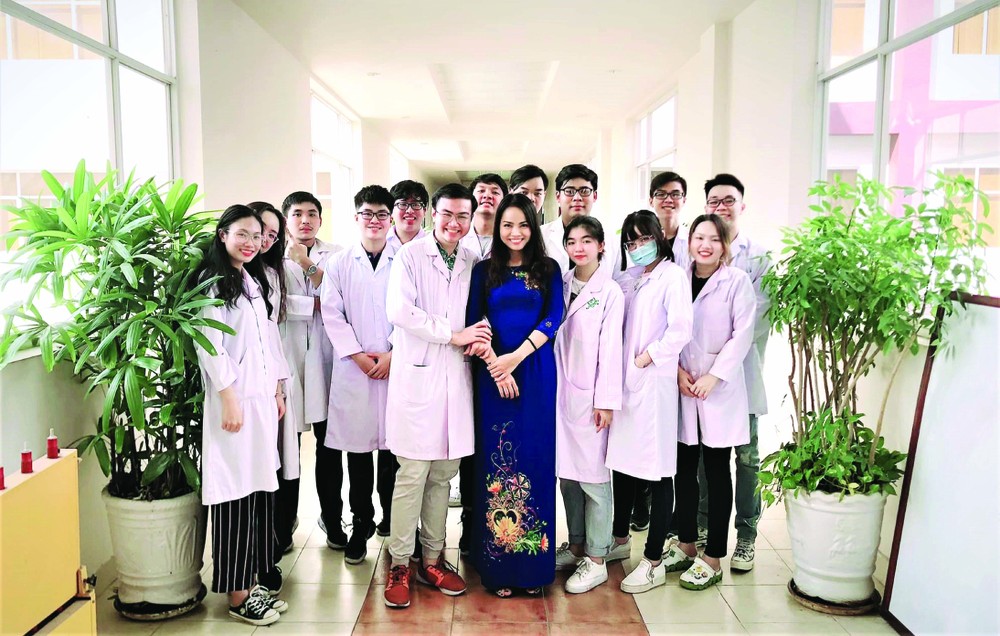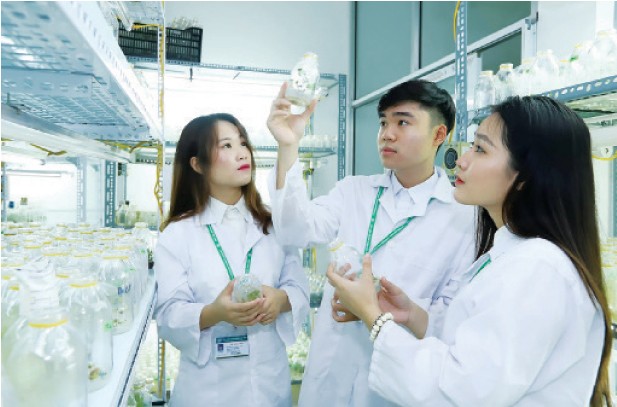 Dr. Duong Nguyen Hong Nhung, the project leader, and her students
Dr. Duong Nguyen Hong Nhung, the project leader, and her students
One day after Ho Chi Minh City loosened the distance to change the social status to a safe and flexible adaptation to the Covid-19 epidemic on October 2, 2021, teachers and students of the University Internationally under Vietnam National University Ho Chi Minh City received the news that their Nanoneem project won the top prize in the contest "Social Business Creation 2021 - Social Business Creation – SBC” in Canada.
The global final round of the competition took place on October 2 with the competition of the top five SBC 2020 and the top five SBC 2021, which brought together 265 teams of 80 universities from 24 countries around the world. A special feature is that five finalist projects must compete with five projects of 2020, the competition; therefore, becomes more intense.
Nanoneem is a research project on the production of plant protection drugs, applying nanotechnology to bring natural ingredients into a more stable and more permeable form, thereby improving the effectiveness of pest control. With herbal origin, Nanoneem aims at clean, safe, and environmentally friendly agriculture. Nanoneem introduces the application of nanotechnology to manufacturing safe plant protection drugs from herbs, toward clean and sustainable agriculture.
The project was developed by Dr. Duong Nguyen Hong Nhung, a lecturer in the Biotechnology Faculty of International University in Ho Chi Minh City, students from the Faculty of Biotechnology in the International University and Hanoi Foreign Trade University. After nearly 10 years of studying in the US, Ms. Nhung got a doctorate at the University of Oklahoma but then she decided to return to Vietnam and work as a lecturer at the International University.
Dr. Duong Nguyen Hong Nhung shared to have mixed emotions that she is happy and proud at the same time at the news of the award. Due to the epidemic, the group could not sit for the exam in person in Canada but had to take the exam online via Zoom software.
During nine months of many rounds and challenges, the panel of judges in various fields asked very difficult questions, forcing them to prepare and constantly study. A judge also helped the team to test products in Canada, New Zealand, Australia, proving that many countries pay heed to organic agriculture.
In the final round, Dr. Duong Nguyen Hong Nhung told the story of her mother who always had to soak vegetables for hours before eating or she had to peel fruits’ skin for fear of toxicity arriving at a conclusion that Vietnam’s agriculture has to change. She wanted her partners to bring their products to more farmers with a commitment to safety and reasonable prices. She hoped to connect more projects on clean agriculture to create real change together.
She announced to spend all of the profits collected from this project on reinvesting in research and technology development as well as supporting the expansion of clean agricultural models, and improving environmental effects of pesticides.
 Students carry out the project in the lab
Students carry out the project in the lab
Beating off 100 projects from applicants around the world, authors of the project "UEH Zero Waste Campus" of the University of Economics Ho Chi Minh City won the first place in the international competition Zero Waste Cities Challenge, an innovation competition for green entrepreneurs in Johannesburg, Ho Chi Minh City and Guwahati.
This is a pioneering project in green and sustainable lifestyle at universities. This global competition is part of WasteAid's Circular Economy Network, sponsored by Huhtamaki and held in Vietnam’s Ho Chi Minh City, India’s Guwahati and South Africa’s Johannesburg.
With the project "Waste-free university", the authors propose innovative solutions, prioritizing the application of the 3R (Reduce - Reuse - Recycle) model in waste classification and treatment as well as technology application in education and communication methods.
The project development is divided into three phases. The first phase in 2021 with the message “Rethink and Be Green” is expected to reduce 40 percent of general waste, 30 percent of single-use plastic waste and can make at least 70 percent of students and school officials understand exactly what zero waste is.
The ultimate goal of the project is to show a tangible impact on waste reduction and resource efficiency in HCMC in the year 2022. The project is strongly oriented towards a university zero waste by 2025, an important component of a sustainable university.
On the behalf of the project team, director of the Ho Chi Minh City University of Economics’ Institute of Smart Cities and Management Trinh Tu Anh said that she hoped to find a formula for the best zero waste university, from which to share it with other universities and organizations to jointly implement for a green, clean city.
























